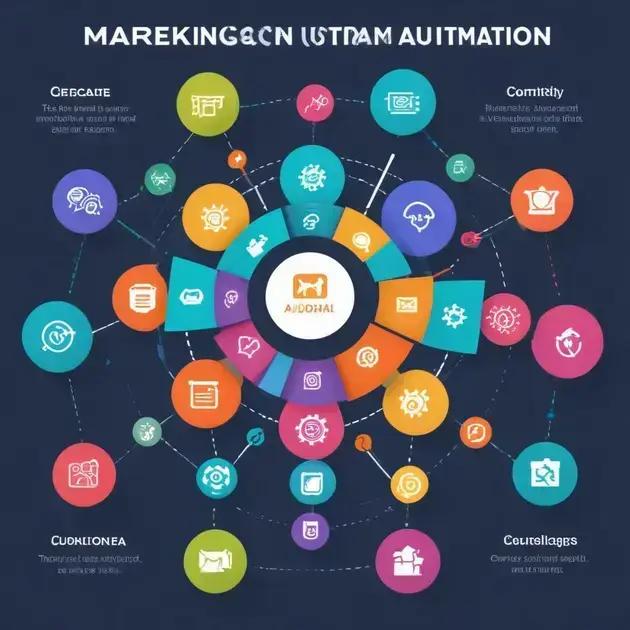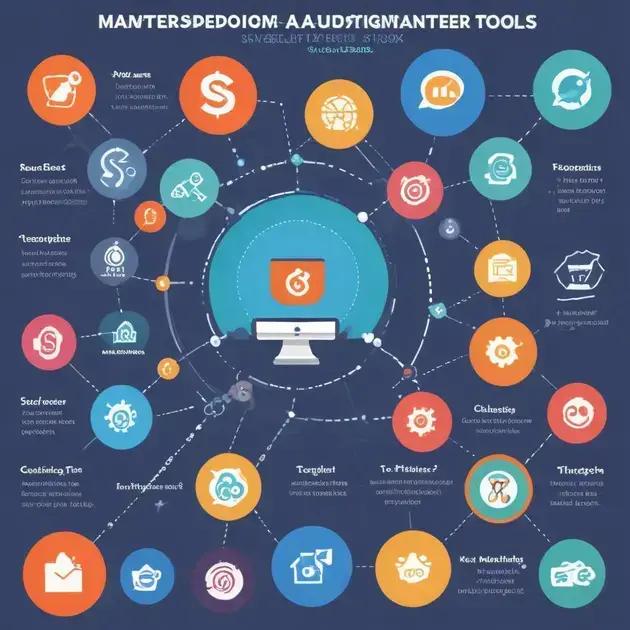Marketing automation software for small businesses streamlines marketing tasks, enhances customer engagement, and boosts overall efficiency. By implementing the right tools and best practices, small businesses can compete effectively, save time, and drive growth.
Marketing automation software for small business has become a game-changer for startups and local companies alike. By automating repetitive tasks and improving customer engagement, these tools empower small businesses to focus on growth. In this article, we’ll dive into what marketing automation software is, its key benefits, and how you can pick the right tool for your needs.
What is Marketing Automation Software?
Marketing automation software is a digital tool designed to help small businesses streamline their marketing efforts. It enables users to automate tasks such as email campaigns, social media management, lead generation, and customer segmentation. By automating these processes, small businesses save time and resources, allowing them to focus on growing their operations.
Key Features of Marketing Automation Software
Common features include email marketing, where businesses can schedule and send personalized communications to their customers. Additionally, customer relationship management (CRM) tools help track interactions with potential clients, while analytics provide insights into campaign performance. These features work together to create a cohesive marketing strategy that can significantly enhance engagement.
How It Works
Marketing automation software typically operates through user-friendly dashboards that connect various marketing channels. Once set up, users can create workflows that trigger specific actions based on customer behavior. For example, if a lead downloads a resource, they can automatically receive a follow-up email nurturing that interest.
Types of Marketing Automation Solutions
There are various types of marketing automation solutions available, ranging from simple email marketing platforms to comprehensive tools that manage customer relationships, social media, and analytics all in one place. Small businesses should evaluate their needs and budget to find software that best suits their strategy.
Benefits for Small Businesses
For small businesses, adopting marketing automation software can lead to improved productivity and a stronger marketing strategy. It helps save time by reducing manual processes and allows for greater personalization of communications, which can lead to higher customer engagement and retention rates.
Benefits of Marketing Automation for Small Businesses

Marketing automation provides numerous benefits for small businesses seeking to optimize their marketing efforts and drive growth. By embracing this technology, these businesses can enhance productivity, improve customer engagement, and generate more leads.
1. Time Savings
One of the major advantages of using marketing automation is the significant amount of time saved. Automating repetitive tasks, such as email sending, social media posting, and lead tracking, allows small business owners and employees to focus on more strategic initiatives. This efficiency reduces the time spent on low-value tasks.
2. Enhanced Customer Engagement
With marketing automation, small businesses can create personalized experiences for their customers. They can send tailored content based on customer behavior, preferences, and past interactions. This personalization increases the chances of engagement and builds stronger relationships with clients.
3. Improved Lead Generation
Marketing automation tools can help small businesses capture leads more effectively. By using features like landing pages and forms, they can collect customer information seamlessly. Automated workflows can follow up with leads instantly, nurturing them through the sales funnel.
4. Better Data Management and Analytics
Marketing automation software allows for easy data collection and analysis. Small businesses can track campaign performance, customer interactions, and ROI. This data-driven approach enables marketers to make informed decisions and improve future campaigns.
5. Scalability
Marketing automation is scalable, making it an excellent fit for small businesses looking to grow. As a business expands, these tools can adapt to increasing demands, ensuring that marketing efforts remain effective and organized.
How to Choose the Right Marketing Automation Software
Choosing the right marketing automation software is critical for small businesses looking to enhance their marketing strategies. With numerous options available, it can be challenging to find the best fit. Here are some key factors to consider when making your selection.
1. Identify Your Needs
Start by identifying the specific marketing tasks you want to automate. This may include email marketing, social media management, lead generation, or customer relationship management. Knowing your needs will help narrow down options and choose software that meets those requirements.
2. Evaluate Features
Check the software’s features to ensure it offers the tools necessary for your business goals. Look for essential functionalities such as analytics for measuring performance, segmentation for targeting specific customer groups, and integrations with other applications you use. This will ensure a smooth workflow across platforms.
3. Consider Ease of Use
It’s important to select software that is user-friendly, especially for small business teams. A complicated interface can lead to frustration and inefficiency. Look for platforms that provide intuitive dashboards and clear instructions. A tool that is easy to navigate will help your team adopt it quickly.
4. Assess Customer Support
Reliable customer support can make a significant difference when implementing new software. Look for providers that offer tutorials, live chat, or extensive knowledge bases to assist you. Responsive customer support ensures you can resolve issues promptly, minimizing downtime.
5. Review Pricing Plans
Finally, compare pricing plans to find one that fits your budget while providing the necessary features. Many marketing automation platforms offer tiered pricing, so consider starting with a basic plan that can grow with your business. Look for free trials or demo options to test functionality before committing.
Top Marketing Automation Tools for Small Businesses

For small businesses looking to implement marketing automation software, there are several excellent tools available. Choosing the right one depends on your specific needs, budget, and desired features. Here’s a list of top marketing automation tools that are user-friendly and effective for small businesses.
1. Mailchimp
Mailchimp is one of the most popular marketing automation tools for small businesses. It offers email marketing, automation workflows, and detailed analytics. Its easy-to-use interface makes it ideal for beginners. Plus, it has a free plan that can help businesses grow their email lists.
2. HubSpot
HubSpot provides a comprehensive marketing platform that includes email automation, social media management, and CRM capabilities. Although it has a wide range of features, it’s user-friendly and suitable for small businesses. The free version includes many essential tools, making it a great starting point.
3. ActiveCampaign
ActiveCampaign combines email marketing with powerful automation features. It allows small businesses to create personalized customer experiences through targeted messages based on user behavior. The tool also includes robust reporting options to analyze campaign performance.
4. ConvertKit
ConvertKit is tailored for creators such as bloggers and artists. It focuses on email marketing and offers a simple interface for creating automated email funnels. Small businesses that focus on content marketing will find this tool particularly helpful.
5. Sendinblue
Sendinblue is an all-in-one platform that includes email marketing, SMS campaigns, and chat features. It is designed for small to medium-sized businesses and offers a powerful free plan. Sendinblue’s automation features are intuitive and effective for driving engagement.
6. GetResponse
GetResponse offers a complete suite for email marketing, landing pages, and automation. Its drag-and-drop interface allows small businesses to create campaigns easily. GetResponse also provides options for webinars, which can enhance customer engagement.
Best Practices for Implementing Marketing Automation
Implementing marketing automation successfully requires careful planning and execution. Small businesses can maximize the benefits of these tools by following best practices that ensure smooth integration and effective use.
1. Set Clear Goals
Before diving into automation, set clear and achievable goals for what you want to accomplish. This may include improving email open rates, increasing website traffic, or generating more leads. Having defined objectives helps measure the success of your marketing initiatives.
2. Start Small
When implementing marketing automation, begin with a smaller project to test the waters. Start by automating one or two processes, like email campaigns or social media posts. This approach allows you to learn and adapt without overwhelming your team or resources.
3. Personalize Content
Personalization is key to effective marketing. Use the data collected from automation tools to tailor your messaging. Segment your audience based on their behaviors and preferences, and send targeted content that resonates with them. Personalized emails and offers drive better engagement and conversions.
4. Monitor and Analyze Performance
Regularly track and analyze the performance of your automated campaigns. Most marketing automation software comes with integrated analytics that show how your campaigns are performing. Review metrics like open rates, click-through rates, and conversions to determine what’s working and what needs adjustment.
5. Train Your Team
Make sure your team is well-trained on the marketing automation tools you are using. Provide resources, documentation, and training sessions to ensure everyone understands how to use the software effectively. A knowledgeable team is crucial for maximizing the potential of automation.
6. Gather Feedback and Adapt
Encourage feedback from your team and your customers. Use this information to continuously refine your strategies. Be prepared to adapt your automation processes based on what resonates best with your audience and the evolving needs of your business.
In conclusion, harnessing marketing automation for small businesses
can transform your marketing efforts and lead to significant growth. By automating routine tasks, personalizing customer interactions, and analyzing performance, businesses can work more efficiently and effectively.
To successfully implement marketing automation, it’s essential to set clear goals, start small, and ensure your team is well trained. Continuously monitor results and be ready to adapt your strategies based on feedback.
By following these practices, small businesses can not only enhance customer engagement but also compete more effectively in today’s digital landscape. Embrace marketing automation and unlock your business’s potential!
FAQ – Frequently Asked Questions about Marketing Automation for Small Businesses
What is marketing automation?
Marketing automation is a technology that helps businesses streamline marketing tasks such as email campaigns, social media posts, and lead generation.
How can marketing automation benefit my small business?
It saves time by automating repetitive tasks, improves customer engagement through personalized messages, and increases overall marketing efficiency.
What are some popular marketing automation tools?
Popular tools include Mailchimp, HubSpot, ActiveCampaign, ConvertKit, Sendinblue, and GetResponse.
Is marketing automation easy to implement?
Yes, starting with small projects and gradually expanding allows businesses to learn and adapt without overwhelming their teams.
How can I ensure my marketing automation efforts are successful?
Set clear goals, personalize content, train your team, and regularly monitor and analyze performance to adapt strategies as needed.
Can marketing automation help me compete with larger companies?
Absolutely! Marketing automation gives small businesses access to tools and strategies that can level the playing field against larger competitors.




